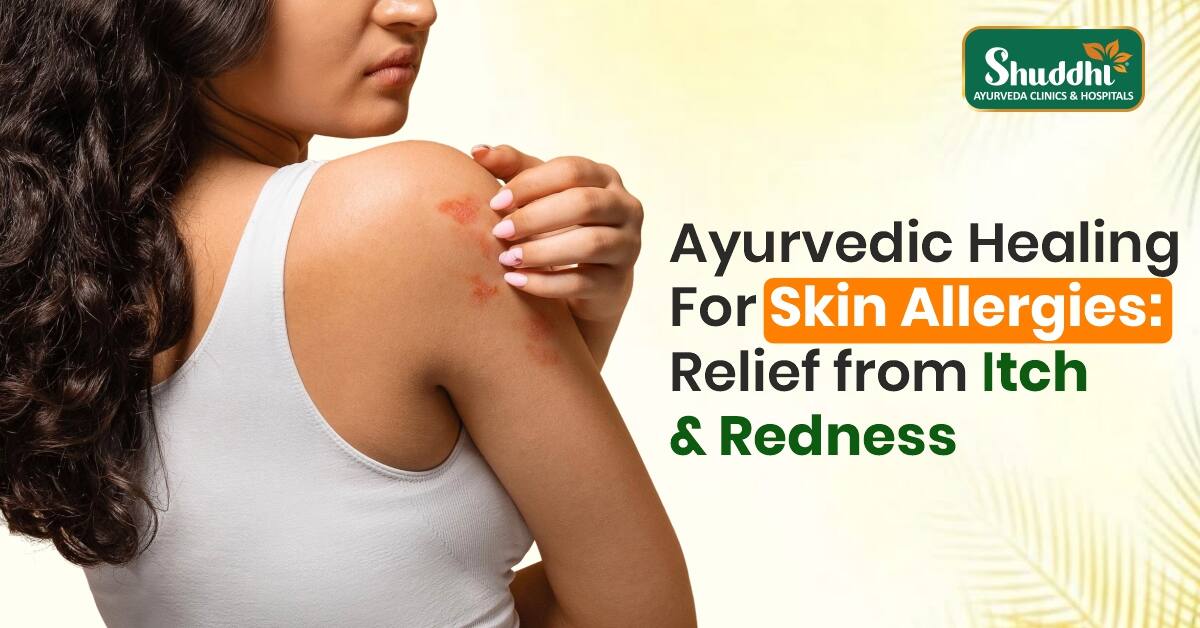No products in the cart.
Ayurveda vs Allopathy: Which Controls Diabetes Naturally?
12 November 2025

Skin allergies aren’t just a surface issue but also a sign that there is an internal problem going on in your body. Symptoms such as redness, persistent itching, rashes, dryness, or swelling can significantly disrupt your daily routine and comfort.
According to Ayurveda, skin disorders are likely to occur when the natural body energies called doshas, primarily Pitta and Kapha, are imbalanced and coupled with the accumulation of toxins (called Ama) in the blood. They appear on the skin in the form of pimples, rashes, and acne, causing continuous itching on the skin.
However there is a better option for us i.e, Ayurvedic treatment for itchy skin provides a natural and safe way to heal, without harsh chemicals or side effects. It focuses on removing the root cause, not just covering the symptoms.
So, how does Ayurveda for skin allergies work? In this blog, we will explore it and also learn about the uses of herbs, detox therapies, and lifestyle changes to calm the body, purify the blood, and restore your skin to its healthy, glowing state.
Table of Contents
ToggleAccording to Ayurveda, the skin (Twacha) is considered an essential organ that represents internal health, rather than just an outward layer. The skin also eliminates pollutants through perspiration to maintain sensation and control body temperature. Skin diseases are the result of imbalances in the body brought on by poor diet, stress, pollution, or an unhealthy lifestyle.
Skin conditions like dermatitis, psoriasis, eczema, and seborrheic dermatitis are frequently associated with:
Skin problems are caused mainly by modern lifestyle, including eating processed food, sleeping too little, and being around pollutants. Typical causes include the following:
1. Snehanam:
What it is: Medicated oils are applied to the body, either internally or topically.
Purpose: Its functions include calming the nervous system, lubricating bodily tissues, and softening poisons.
Benefits: It includes better skin, less dryness and stiffness, and body preparation for detoxification.
2. Swedanam:
What it is: Using steam or herbal heat to induce sweating.
Purpose: Its function is to open pores and release pollutants through perspiration.
Benefits: It includes pain relief, increased blood flow, decreased oedema, and detox assistance.
Nidana Parivarjana (Ignoring the source)
Determine the underlying cause of the skin disease and avoid exposure to any triggers, such as specific foods, routines, or environments.
Shodhana (Panchakarma, or Purification Therapy)
Toxins can be eliminated from the body using these detoxification methods:
3. Samana:
To balance the body and control symptoms, use internal Ayurvedic medications, therapeutic foods, and lifestyle modifications.
Below are the natural remedies for skin allergy:
Herbal treatment for skin irritation made from the herbs in your slide:
By balancing doshas, cleansing the blood, and boosting immunity, Ayurvedic treatment for itchy skin offers a gentle, comprehensive approach that promotes internal healing. By combining herbs such as neem, turmeric, and triphala with Panchakarma, a healthy diet, and good lifestyle choices, Ayurveda for skin allergies seeks to address the underlying issue rather than merely masking the symptoms. You get long-lasting, side-effect-free relief with Ayurvedic skin care. Herbal treatment for skin irritation offers efficient, all-natural healing for all skin types, regardless of the cause—rashes, dryness, or persistent irritation. Reconnect with nature and let Ayurveda gently and naturally restore the health and beauty of your skin. If you need a personalised treatment with no side effects, visit the nearby Shuddhi clinic.
Q1. What is the most effective Ayurvedic treatment for skin irritation?
Triphala kadha or neem oil aids in detoxification and relaxation.
Q2. Can skin allergies be permanently cured by Ayurveda?
With regular dietary adjustments, herbal remedies, and detoxification.
Q3. Which plants used in Ayurveda relieve skin irritation?
Tulsi, neem, aloe vera, and turmeric are all very beneficial.
Q4. Can skin allergies be treated with Panchakarma?
Practices like Raktamoksha and Virechana provide a thorough cleansing.
Q5. What distinguishes Ayurvedic skin care from contemporary creams?
It has no adverse chemical effects and heals from the inside out.

With our VOPD service, you can talk and consult with our doctors at the comfort of your home
Shop online from a wide range of ayurvedic products.
We have 22+ Panchakarma Centres where you can visit & take benefit of Panchkarma therapies
We have 52+ Shuddhi Clinics all over India where you can visit for all your health concerns.
We have 45+ hospitals in different locations in India. We have hospitals in Meerut, Derabassi, Lucknow, Navi Mumbai. We are coming up with many more hospitals to take the right and effective treatment across India.
All our products are delivered on time. We strive to ensure the best and timely service to our patients.
Guru Manish Ji founded Shuddhi for one purpose only i.e, to give a disease-free life to all. He believes that with the help of Ayurveda & Naturopathy balancing all three doshas, one can get rid of any health issue. As an Ayurveda & Naturopathy Guru & Ambassador Manish Ji emphasizes a lifestyle that revolves around a healthy lifestyle, balanced diet, Yoga, and Meditation.
read more© Shuddhi, All Right Reserved.
